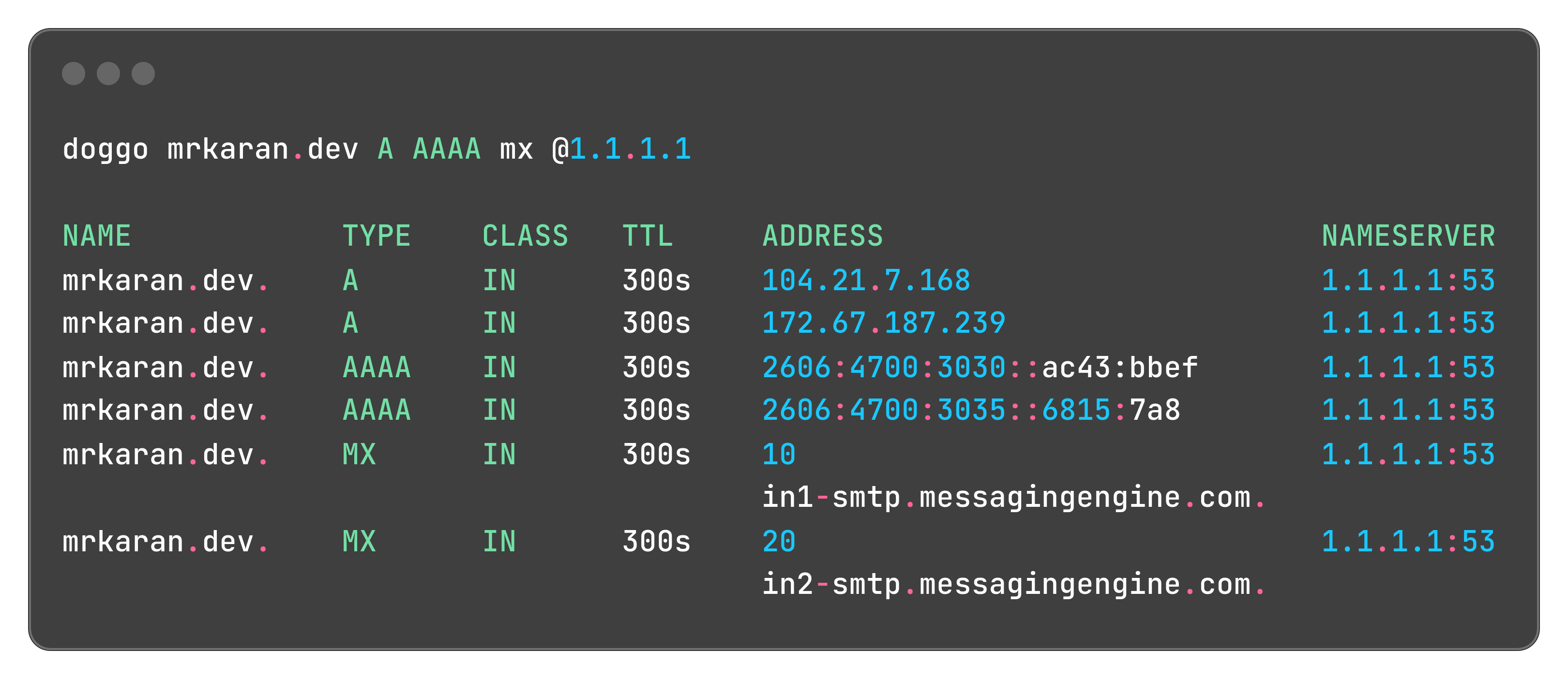doggo is a command-line DNS client for humans inspired by the Rust-based dog utility. It supports traditional DNS queries over UDP and TCP protocols. This is the default mode of operation and is compatible with standard DNS servers.
doggo outputs information in a neat concise manner and supports protocols like DoH, DoT, DoQ, and DNSCrypt as well.
This is free and open source software.
Features include:
- Provides flexible output formats to suit different use cases, from human-readable colored output to machine-parsable JSON. By default, Doggo uses a colored, tabular format for easy readability. For scripting and programmatic use, Doggo supports JSON output. It can also provide short output.
- Multiple transport protocols:
- DNS over HTTPS (DoH) which encrypts DNS queries and responses, enhancing privacy and security by preventing eavesdropping and manipulation of DNS traffic. .
- DNS over TLS (DoT) which provides encryption for DNS queries, enhancing privacy and security by protecting DNS traffic from interception and tampering.
- DNS over QUIC (DoQ) – rotocol that enhances security through data encryption and improves internet performance by utilizing QUIC. QUIC, or Quick UDP Internet Connections.
- DNS over TCP.
- DNS over UDP.
- DNSCrypt – a protocol that authenticates communications between a DNS client and a DNS resolver. It prevents DNS spoofing and provides confidentiality for DNS queries..
- Support for ndots and search configurations from resolv.conf or command-line arguments.
- Multiple resolver support with customizable query strategies. This allows you to compare responses or use different resolvers for different purposes.
- IPv4 and IPv6 support allowing you to perform DNS queries over either protocol. To query for IPv6 addresses, you need to explicitly request AAAA records.
- Shell completions for zsh and fish enhancing your command-line experience with auto-completion for commands and options.
- Reverse DNS lookups allowing you to find the domain name associated with a given IP address. This feature is useful for network diagnostics, security analysis, and understanding the ownership of IP addresses..
- Flexible query options including various DNS flags (AA, AD, CD, DO, etc.).
- Debug mode for troubleshooting.
- Response time measurement.
- Cross-platform support – runs under Linux, FreeBSD, NetBSD, macOS, and Windows.
Website: github.com/mr-karan/doggo
Support:
Developer: Andrey Meshkov
License: MIT License

doggo is written in Go. Learn Go with our recommended free books and free tutorials.
| Popular series | |
|---|---|
| The largest compilation of the best free and open source software in the universe. Each article is supplied with a legendary ratings chart helping you to make informed decisions. | |
| Hundreds of in-depth reviews offering our unbiased and expert opinion on software. We offer helpful and impartial information. | |
| The Big List of Active Linux Distros is a large compilation of actively developed Linux distributions. | |
| Replace proprietary software with open source alternatives: Google, Microsoft, Apple, Adobe, IBM, Autodesk, Oracle, Atlassian, Corel, Cisco, Intuit, and SAS. | |
| Awesome Free Linux Games Tools showcases a series of tools that making gaming on Linux a more pleasurable experience. This is a new series. | |
| Machine Learning explores practical applications of machine learning and deep learning from a Linux perspective. We've written reviews of more than 40 self-hosted apps. All are free and open source. | |
| New to Linux? Read our Linux for Starters series. We start right at the basics and teach you everything you need to know to get started with Linux. | |
| Alternatives to popular CLI tools showcases essential tools that are modern replacements for core Linux utilities. | |
| Essential Linux system tools focuses on small, indispensable utilities, useful for system administrators as well as regular users. | |
| Linux utilities to maximise your productivity. Small, indispensable tools, useful for anyone running a Linux machine. | |
| Surveys popular streaming services from a Linux perspective: Amazon Music Unlimited, Myuzi, Spotify, Deezer, Tidal. | |
| Saving Money with Linux looks at how you can reduce your energy bills running Linux. | |
| Home computers became commonplace in the 1980s. Emulate home computers including the Commodore 64, Amiga, Atari ST, ZX81, Amstrad CPC, and ZX Spectrum. | |
| Now and Then examines how promising open source software fared over the years. It can be a bumpy ride. | |
| Linux at Home looks at a range of home activities where Linux can play its part, making the most of our time at home, keeping active and engaged. | |
| Linux Candy reveals the lighter side of Linux. Have some fun and escape from the daily drudgery. | |
| Getting Started with Docker helps you master Docker, a set of platform as a service products that delivers software in packages called containers. | |
| Best Free Android Apps. We showcase free Android apps that are definitely worth downloading. There's a strict eligibility criteria for inclusion in this series. | |
| These best free books accelerate your learning of every programming language. Learn a new language today! | |
| These free tutorials offer the perfect tonic to our free programming books series. | |
| Linux Around The World showcases usergroups that are relevant to Linux enthusiasts. Great ways to meet up with fellow enthusiasts. | |
| Stars and Stripes is an occasional series looking at the impact of Linux in the USA. | |
